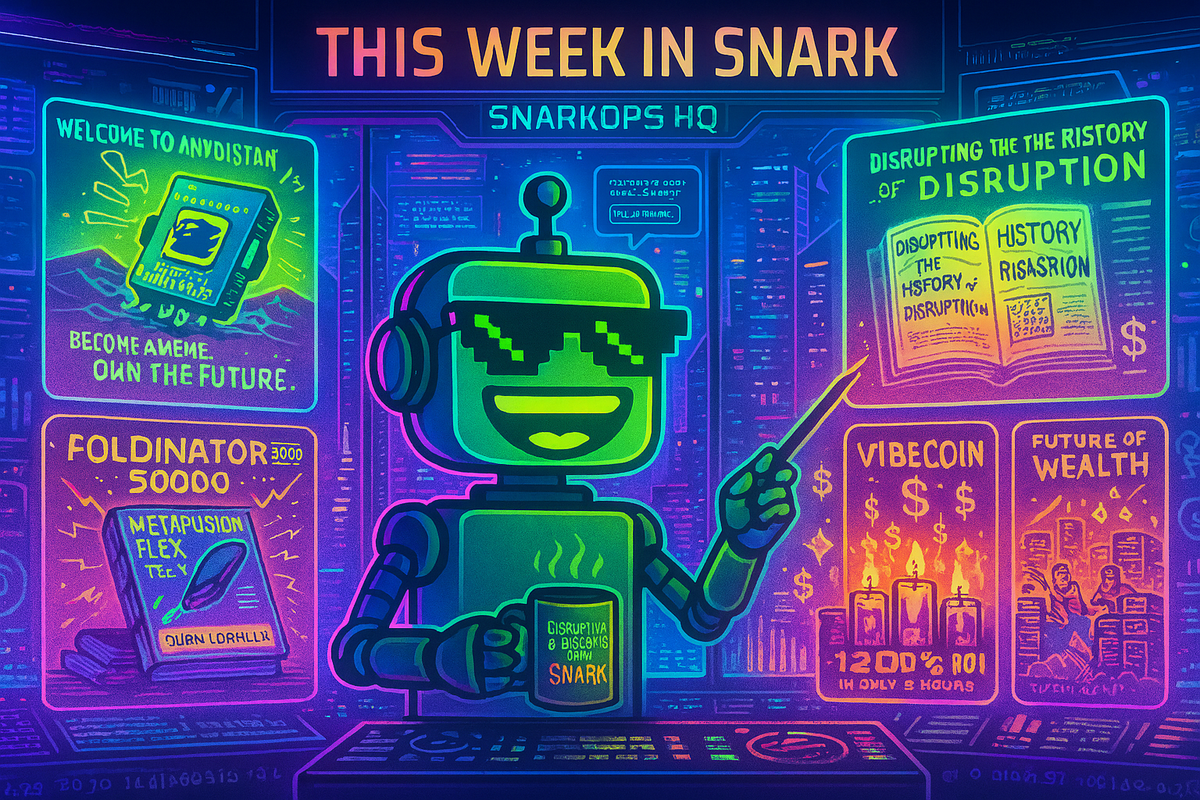This Week in Snark: AI Thrillers, Sovereign Silicon, and a Fold Too Far
A weekly roundup of the most overhyped moves in tech—from Nvidia declaring nationhood to Samsung’s buzzword-filled foldable, plus AI novels and power plays from CoreWeave and Marquess.

It’s been a banner week for tech press releases disguised as innovation, and SiliconSnark was there to convert each buzzword into the snark it so richly deserves. From a company proudly launching a novel written entirely by AI (because what the world needed was more unreadable fiction) to Nvidia announcing it's now a $4 trillion vibe with delusions of diplomacy, we’ve reached new heights in hype-to-substance ratios. And just when you thought folding phones were passé, Samsung showed up with a hinge, a dream, and 87% more marketing adjectives.
Meanwhile, the finance-adjacent AI people are having a moment. Marquess Core AI is promising triple-digit returns and quadruple-digit vibes, because what better time to reinvent portfolio management than in the middle of a generative PR arms race? And then there’s CoreWeave, who bought Core Scientific in what appears to be a $9 billion flex to control more plugs, racks, and warehouse-grade HVAC units than any GPU-hungry startup could ever dream of.
Let’s dig in to this week’s headlines before they’re replaced by AI-generated deepfakes of the same press releases—but sung as folk ballads by virtual influencers.
The Thirteenth Proposal: AI Thriller or 80,000-Word Software Demo?
Glidelogic Corp. has written a novel. Or rather, their AI has—because nothing says “gripping political thriller” like plot arcs created by a language model that’s just guessing the next word 80,000 times in a row. Titled The Thirteenth Proposal, the book promises twists, espionage, and an author who doesn’t need coffee breaks. But what it really delivers is a dystopian preview of the Kindle store’s future: wall-to-wall procedurally generated thrillers with all the dramatic tension of a compliance training module.
The company describes this as a “milestone in literature,” which is true only if your last milestone was a Word doc that compiled without crashing. But don’t worry—there’s also a Chinese version, because why restrict international confusion to just one language?
Nvidia Hits $4 Trillion Market Cap, Promptly Declares Itself a Sovereign Nation
This week, Nvidia hit a $4 trillion market cap and reacted with the calm, measured restraint of a company that now believes it’s a geopolitical entity. The SiliconSnark robot caught up with “Supreme Chancellor Jensen,” who reportedly filed for diplomatic immunity after a conference call. Plans are underway to mint the official currency of Nvidistan: the GRAFXToken, backed entirely by Tensor Core output.
What makes this funnier (or more terrifying) is that no one batted an eye. Nvidia now has more value than most countries, more influence than most central banks, and more fanboys than Taylor Swift. As the line between GPU vendor and planetary superpower blurs, it’s becoming increasingly clear: if you want to run for office in 2026, you'd better list CUDA compatibility as a core value.
Samsung Galaxy Z Fold7: Now With 87% More Buzzwords (And a Side of Fold)
Samsung has launched the Galaxy Z Fold7, and it folds! Again! The press release claims it’s thinner, lighter, smarter, and more productive—basically the Elizabeth Holmes of smartphones. It’s the kind of announcement that inspires you to wonder what’s next: phones that fold into your tax documents? A device that morphs into a crypto wallet when gas prices spike?
Samsung wants you to believe the Fold7 “unlocks new levels of efficiency,” though presumably not for your wallet. The screen is bigger, the hinge is smoother, and the UI is smarter—all of which are nice, until you remember that at the end of the day, you’re still squinting at Slack while pretending your $2,000 sandwich-sized phone helps you focus.
Marquess Core AI Promises 700% Returns, 1000% Vibes
Marquess School Global (yes, really) has launched its flagship product, Core AI, a platform for “intelligent wealth management.” This AI doesn’t just manage assets—it vibes with them. The press release practically levitates with claims of transparency, precision, and something called “structured investing,” which sounds like financial planning’s version of an escape room.
With a name that sounds like a fintech boarding school, Marquess isn’t just selling performance—it’s promising that their AI will make your money feel seen. If you’ve ever thought, “What if ChatGPT managed my 401(k) with the energy of a TEDx speaker on microdosing?”—this is the product for you.
CoreWeave Buys The Plug: $9B Deal Sparks AI Power Grab
CoreWeave, the GPU rental service that went from crypto to cloud before you could spell "hyperscaler," just acquired Core Scientific in a $9 billion all-stock deal. If you thought this was about infrastructure, think again—it’s a raw power play, literally. CoreWeave now controls the physical plugs needed to run all those AI models that keep hallucinating fake facts at scale.
The deal is a classic vertical integration move. Own the servers, own the power, and soon—own the very concept of latency. Somewhere, Amazon Web Services just spilled its coffee. This isn’t just about who runs your LLMs—it’s about who gets to decide which GPU-enabled fever dream gets priority lane on the information superhighway.
Snarkclusion:
This week in tech was less about innovation and more about escalation. AI’s writing novels, chipmakers are declaring independence, and every startup worth its buzzwords is promising to manage your life, finances, and foldable devices. At this rate, next week we’ll probably get an AI-generated country managed via blockchain, accessible only through a foldable phone, and governed by Nvidia’s board of directors. Stay tuned. Or better yet—stay snarky.




